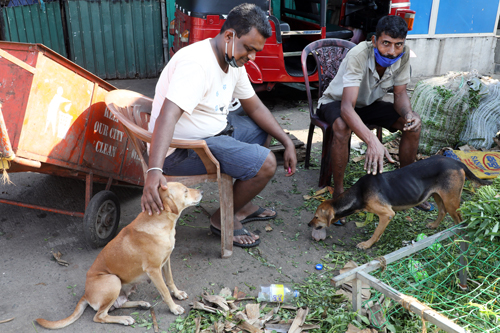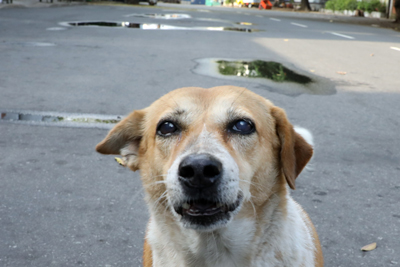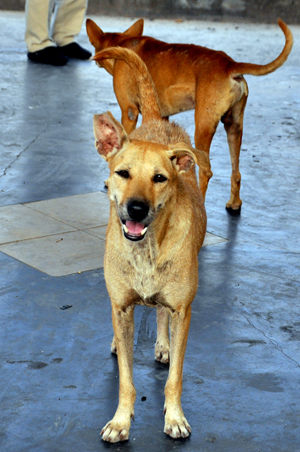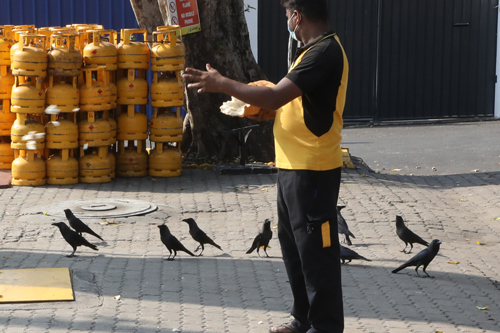News
Thousands of nameless city dwellers walk the streets starving

Man's best friend Pix by M A Pushpa Kumara and Priyantha Wickramaarachchi
Thousands of cats, dogs, pigeons and crows are hungrily scanning the streets for food as workplaces, shops and markets remain closed for three weeks.
The strays’ usual sources of sustenance are missing: the people who went around feeding them are restricted to their homes; the vendors and merchants on Colombo’s busy streets who tossed leftovers to them are no more at their posts; all the garbage dumps have been cleared.
The roads are vacant near the Pettah Market; dogs can be seen walking about while pigeons and crows roost on top of closed shops.
There were some policemen sharing their meals with several dogs but too many dogs gathered and there was not enough food for all.
Some city residents are providing relief for a few starving animals by putting out bowls of food and water in front of their homes.
Hungry people from low-income and daily-age earning families are the government’s priority, rather than feeding animals.
Colombo District Secretary Pradeep Yasaratne told The Sunday Times there was no government plan yet for providing food for street dogs and cats.

Pleading eyes
“There are more than 132,000 low-income groups living in Colombo,” Mr. Yasaratne said. “Labourers, barbers and nattameys (workers carrying heavy loads on their backs), who earn daily wages, are heavily affected by the curfew.”
There are estimated to be half a million street dogs in the country.
Monkeys, as well as dogs and cats, depend on humans for food near city limits. Toque macaque monkeys, locally known as rilawas, that live near tourist sites in Kandy, Polonnaruwa, Anuradhapura and Hambantota, now have nothing to eat,
These monkeys, which survive by either stealing food from markets or living off food offered by tourists, have now formed large groups and are fighting each other whenever one finds a morsel of food. They have also started to venture into houses in search of food and water.

Activists trying to feed strays could not get to cats and dogs living in shuttered private office buildings, schools and universities
Kandy District Secretary Tissa Karunaratne said he was aware that dogs, cats and monkeys roaming around his district are facing a shortage of food.
He said the monkeys are growing violent and acknowledged thought needed to be given to providing relief for the hungry animals. He would take up the matter at the District Committee Meeting.
He too pointed out, however, that priority is being given to giving food and essential goods to low-income families reliant on a daily wage that has vanished because of the curfew.
Animal shelters and animal welfare groups are begging police to provide them with curfew passes so at least one or two volunteers could go out into the streets with food for animals.
Well-known animal rights activist and Secretary of the Animal Protection Trust, Shamini Ratnayake, said obtaining curfew passes was the activists’ biggest problem.
The Secretary of the Kandy Association for Community Protection through Animal Welfare (KACPAW), Champa Fernando, said she could feed strays if only she were given a curfew pass but had been told by police to stay at home.
She had been offered a pass valid for just two hours to sterilise six puppies and a female dog she was fostering.
“I was last able to feed street dogs on March 26. Afterwards, the Kandy District was locked down by strict curfew. Even though I submitted letters requesting the police to allow me to feed stray animals, they denied permission,” Ms. Fernando said.
She called attention to the fact that activists trying to feed strays could not get to cats and dogs living in shuttered private office buildings, schools and universities as they had no entry to these premises.
Ms. Fernando pleaded with the government to consider the provision of food and water to stray animals as an essential service and for veterinary surgeons to be given curfew passes to provide emergency care.
She said her organisation had to cancel several dog sterilisation programmes in Polgolla and Nuwara Eliya because of the curfew and warned the stray dog population might increase.

Sharing a meal
There is increasing anxiety and sadness about the animals’ wretched situation. A Colombo resident told this paper he was anxious over the fate of six stray dogs living near his home.
“We used to feed them until a few days ago but we have not seen them lately,” he said.
“Today, one of neighbours said five of them had died and the remaining dog looks weak and unsteady on its legs. If there was no curfew we could have taken it to a vet but we can’t.”
An animal rights activist in Colombo, Sharadha de Saram, said she had been feeding three street dogs living in Wellawatte near Charlemont Road. Police had initially allowed her to feed the animals but after the strict curfew was imposed she had had stay at home.
She, like other activists, still collects food and other supplies so that those who have curfew passes can use it to feed strays, including the three dogs she had been feeding, she said.
Ruwan Douglas, a 42-year-old former army officer who has dedicated his life to feeding street dogs, said he was continuing the work during the lockdown.
He feeds dogs and cats in Wellawatte, Mount Lavania, Bambalapitiya, Narahenpita and Ambagas Handiya Junction at Angoda.
He currently has 20 dogs with health problems living with him and is working on restoring them to fitness.
“I have been feeding dogs for the past 12 years but after this lockdown I doubled my efforts,” he said. “The police are very supportive as they know what I am doing. I obtained a curfew pass so I could carry out my work.”
He said he ordered 100kg a week of chicken liver, offcuts and necks from a poultry producer to feed strays and keeps a stock at home. Friends help him to carry out his task. The curfew has made ordering and storage extra difficult.
Animal rescuer Sahana Ravishankar, 26, a lawyer, said she and her mother were feeding street dogs and asked for donations of dog and cat food and cooked rice.
“As curfew is imposed I don’t always go out to feed the dogs but when I do I make sure that I also give bags of dog and cat food to security officers, employees and labourers so they can feed the dogs that live inside their company properties and lodging areas,” she said. Anyone wanting to help her can call 0777567122.
Food shortage is a great concern for animal shelters. The Animal Welfare Protection Association (AWPA) said it is difficult to source rations to feed the 470 dogs and 70 cats in its two shelters.
“Fortunately, there are shelter staff resident at both homes,” AWPA Secretary Shiona Weerasekera said. “There is worry for the days ahead and supplies are being carefully managed. We are also concerned as most veterinary clinics are closed and mobile veterinary services are very limited.”
| Keep a bowl outside your gates for furry friends | |
| Animal welfare organisations are asking households to keep a bowl of water and some food at their gates for stray cats and dogs as an alternative to going out in curfew breaks to feed the animals. “A little kindness can save a life of an animal,” the Secretary of the Kandy Association for Community Protection through Animal Welfare (KACPAW), Champa Fernando said. She also asked pet owners to seek care guidance and medical advice from online veterinary services or by calling local vets and to only visit a vet when an animal has serious health complications.
|


